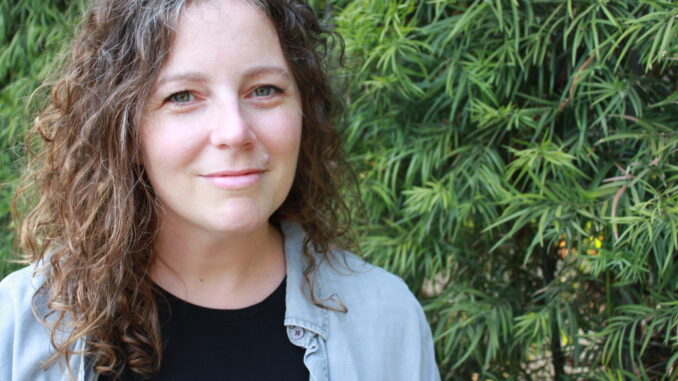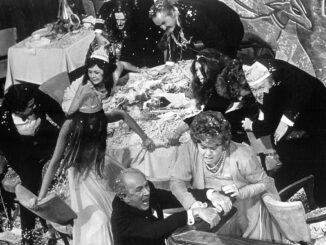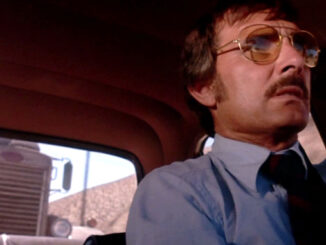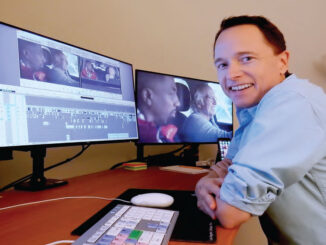
by Patrick Z. McGavin
The career of the New York-born editor Jennifer Vecchiarello illustrates her perseverance and dedication.
After studying filmmaking at Syracuse University, Vecchiarello apprenticed under the editor Alan Edward Bell, ACE, on studio projects like “The Hunger Games.”
Her newest credit is “Kajillionaire,” the third feature of writer and artist Miranda July. Starring Evan Rachel Wood, Richard Jenkins and Debra Winger as a quixotic family of con artists, the movie is currently in wide theatrical release.
Vecchiarello talked about negotiating the movie’s difficult tonal range from the absurdist to the wistful and tragic.
CineMontage: How did you make the professional transition from assistant to editor?
Jennifer Vecchiarello: It’s a complicated and loaded issue. Personally my path was more of an old school one where I was assisting primarily one editor for ten years, Alan Bell. He was a great mentor. I just learned so much about the craft, the creative and technical side of storytelling, and also the experience of living in the cutting room. I definitely owe him a huge debt of gratitude.
Your earliest editing credits are always going to be for little or no pay. At least that was my experience. I was trying to get opportunities to do it while I was making a living assisting. That was really hard. There is this narrative out there if you work really hard, you will make that leap. That was a rare time in my life where I had the ability to do that.
This is going back six or eight years. If I were trying to do that right now, I am pretty confident I would not be able. I have a child now. There’s no way I’d be able to work 60 hours as an assistant, come home and do additional work at nights or on weekends.
It’s such a privileged thing to take the leap from assistant editor. It means you are going to turn down viable assistant work that is going to help you make a living to pursue editing work that is going to be less stable in the beginning. In order to do that, you need to put yourself in a position where you are not dictated by how you make that decision. That is the definition of privilege. That’s an opportunity many people are not afforded.
Miranda July, the director and writer of your new film “Kajillionaire,” has a very distinctive visual style. What did that mean for you creatively?
Her style is everywhere in the footage, the dialogue that the actors are saying, even the shot composition. The whole world, the look, you feel immersed in the world of Miranda July.

It was kind of an intuitive thing because the footage guided you. The performances guided you. I was most concerned with letting it breathe. That was the one thing I could really identify with, finding those human moments in the pauses, in the silences, in Evan Rachel Wood’s performance. Whenever in doubt, we could look at Evan and look at what she was doing. She just knocked it out of the park.
I also wanted to stay wide (in the frame) whenever we could because it was such a unique world, seeing the family occupy their space and getting a sense of the world they are in.
What is Miranda July’s process like? Was she in the room with you?
We were there together every day. Our first assistant, Christi Leftwich, was also there with us. She totally got the tone from the beginning, and she was a great pair of eyes to be constantly showing things.
Miranda follows her vision, and that vision is really strong. She shoots until she gets what she wants. In post, once we know we have everything, she is not precious about the script or reluctant to restructure things or add things as needed.
In the film there are a lot of plot points that needed to happen. There is a payoff at the end that needs to be put out properly. You hold your breath that the payoff is going to work, or else you are going to say, “No.” But it always did because of the script. That was all Miranda.
The story is about a family of con artists. Did you talk about ways of making the characters more emotionally identifiable to an audience?
By the time it was in our hands, I don’t think we had to work very hard with that. Richard Jenkins is just the definition of charming. As abhorrent as their behavior can be, Richard is charismatic. He is an alpha, and you follow along. He is on a path I would not want to be on, but the deeper humanity is always there.
The same with Debra Winger. I always found myself wondering about their past, and how they got there. Debra’s character has this wistfulness that always gave me the sense there is something going on behind the curtain.
Don’t you have a bit of an acting background?
I love theater. I was a drama minor in college. I studied it, but acting was never something I did or pursued. Acting does inform editing, for sure. I just have always approached material around the performances. I watched all the dailies. Whenever any of the actors make me feel anything, I just always make notes—anytime I find myself feeling angry or sad or find myself getting emotional.
I don’t know how common this is with other editors. Oftentimes when I am watching material on the screen, I catch my face contorting to the same expressions that the actor is making. That is how I know it is really working.
When Melanie (Gina Rodriguez) enters the story, it shakes up the family dynamic. It also leads to two extraordinary scenes when the family goes inside the homes of two different marks. The first is played for comedy, the second as tragedy.
I think what’s interesting in both scenes is that you see Evan’s character on her own. Throughout the course of the film she is coming into her identity and figuring out who she is outside the family unit. The first one she is feeling a bit alienated.
In the later scene, I think you really see her make a choice of great empathy that I don’t think her parents would be capable of making. It never even would have even occurred to them. That second scene is one of my favorites. I just love that piece from day one, like the song Melanie plays on the piano. It just speaks to me. In the editing room, you think of yourself as the cook. The ingredients on that were just sublime. I just had to cook it right.
The subsequent bathroom scene with Evan and Gina is almost pure abstraction. The tone is much different, a poetic and eerie silence.
I never saw anything like that before, and I found it so moving. It’s a big ask to have an audience tune into a black screen for a long period of time. Eventually the mind is going to wander no matter how moving the performances are underneath. I think we just embraced it. We looked for little details from the dailies that we could continue and hold onto. That was something we worked on quite a bit, making sure all the right things were said.
The developing friendship of the young women becomes the dominant theme. Is that an example of how the film was sharpened during post?
I think that is where most of our attention ended up going throughout the post, that emotional arc because we always wanted it to be subtle. You never wanted to be hit over the head with it. At the same time, it had to be earned. You had to feel it coming, even if you couldn’t identify it.
I’ve heard Miranda speak out about this. We always pointed out if it was too subtle, it would come out of nowhere for people. It was not following the heteronormative rules we are used to seeing. If one of the gender roles were reversed, you’d see the writing on the wall immediately. It was something we had to constantly dial in to make sure it felt organic.
I should say too, the chemistry between the two actresses was always there. That was never created. Those two actresses brought so much. We never had to create the chemistry or the tension. It was always a matter of modulating it, and making sure that it was said at the right pace, at the right way at the right time.
Now that you are a final arbiter, have your attitudes about shaping actors performances changed?
That is just where the heart is. It’s when you can stay almost longer than your instinct would tell you and live in these difficult moments that might be awkward for the actors. I think that’s where so much can be learned and explored.
Performance is always key for me. That is what I always build everything around. I always choose the best performance and I make the footage work around it. If continuity is an issue, then we always find a different way for it to work, cut out an arm if we have to. You do that to make sure the performance is the reason you are choosing. Every shot is a choice. Performance is what always drives everything.
We talk about a director’s style, a cinematographer’s style. Do editors have an equivalent style?
I don’t know if I would call it a style. I think of it more as living in that footage, hearing the tone that’s there, and figuring out the best way to curate that for the audience.
I am sure if I were to go back and look at my work, there are a lot of similarities in the way I approach things. That would be my style. It’s like an accent. You never hear your own accent. The rhythm and structure I approach the piece varies based on the material, like if it’s an action scene or something more emotional. I think it’s about being able to shift between styles as needed and make it feel cohesive.
Patrick Z. McGavin is a Chicago-based writer and film critic.





